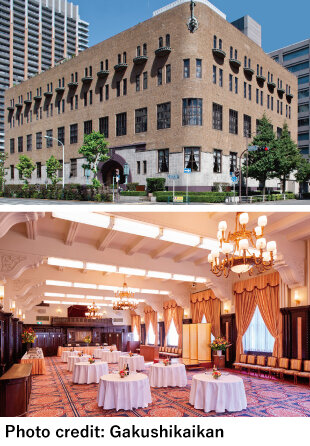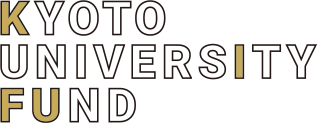Vol.17 Three-person Discussion
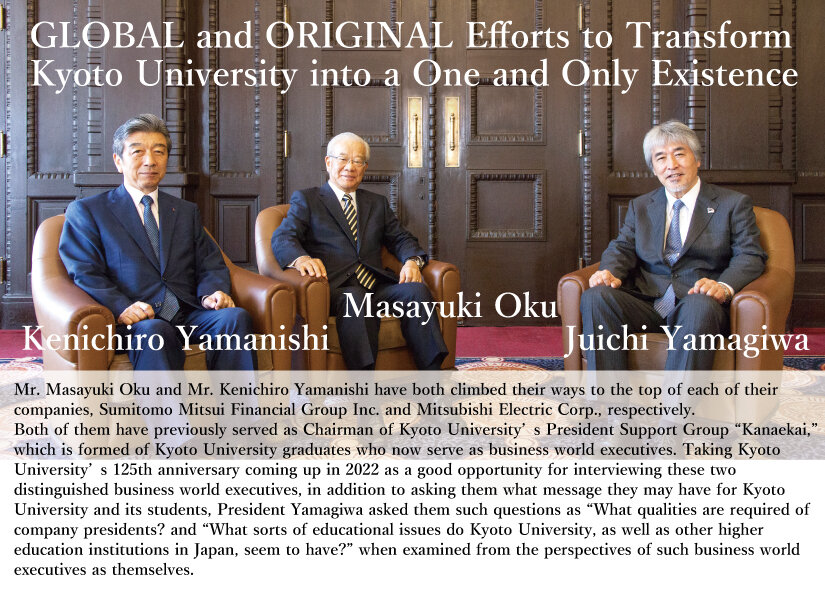
Masayuki Oku
Honorary Advisor of the Sumitomo Mitsui Financial Group, Inc.
Born in Nagano Prefecture in 1944. Joined Sumitomo Bank, Limited, after graduating from Kyoto University's Faculty of Law in 1968. Served as Chicago Branch Manager, International Affairs Division Manager, Planning Division Manager, Sumitomo Mitsui Banking Director and Senior Managing Executive Officer, Director and Deputy President, President and Chief Executive Officer, and Chairman of the Board of Sumitomo Mitsui Financial Group, before assuming his current position. Served as Chairman of the Japan Bankers Association and Vice Chairman of the Japan Business Federation. Currently serves as Advisor to the President of Kyoto University and as Chairman of the Osaka Philharmonic Orchestra. Completed the University of Michigan Law School (USA).
Kenichiro Yamanishi
Mitsubishi Electric Corporation Executive Corporate Advisor
Born in Osaka Prefecture in 1951. Joined Mitsubishi Electric, after graduating from Kyoto University's Department of Mechanical Engineering of the Faculty of Engineering in 1975. Served as Executive Officer, Senior Executive Officer, Representative Executive Officer and President & CEO, Chairman, and Director and Senior Advisor, before assuming his current position.
Became Vice Chair of the Japan Business Federation in 2017. Currently serves as President of the Japan Tennis Association.
The helpfulness of a strong desire to acquire a broad knowledge and the ability to read the future in serving as a company president
Yamagiwa I understand that Mr. Oku joined a bank after graduating from our Faculty of Law, while Mr. Yamanishi chose an electronics manufacturer after graduating from the Faculty of Engineering. First, may I ask how each of you decided what path to take after graduating?
Oku In my case, I have no other way of putting it than to say I joined my bank by sheer chance. I originally wanted to enter not the legal sector but the manufacturing industry, which was booming at the time. My dream was to work in the international business world. However, a Sumitomo Bank recruiter changed my mind by very enthusiastically introducing me to many facts I never knew until then. I was convinced that working at a bank would be fun.
Yamanishi I majored in both chemical and mechanical engineering. However, chemical manufacturers back then struck me as conservative. My interest subsequently concentrated on mechanical engineering when I found out that my instructor, who was an associate professor of chemical engineering, had in fact majored in mechanical engineering. I visited three electronics manufacturers and participated in their observation tours. As was the case with Mr. Oku, the determining factor in choosing Mitsubishi Electric was an inspiring recruiter.
Yamagiwa Not that I know how many people who became company presidents entered their companies with already the aim of becoming president, but what was the case with the two of you?
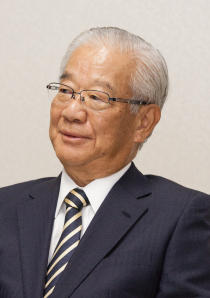
Oku The only interest I had when I entered was to experience all kinds of work, including doing business with companies overseas. I had no ambition of becoming president.
Life is a cycle of meeting new people and making decisions. We have no control over who we meet, but the decisions we make are our own choices. Therefore, when making decisions, we must do everything we can to make the right ones. I believe always trying hard to make the right decisions throughout my career led me to the position of president.
Yamanishi My aim was to develop unique products and technologies, so immediately after entering, I requested to be assigned to one of the company's research laboratories. I remember beginning to develop a slight interest in managing around the time when I was appointed the factory manager of manufacturing.
Yamagiwa Konosuke Matsushita once described the characteristics he thought would give a person a better chance of succeeding as being charming, seeming luckier than others, and being able to inspire others to follow by example. All of them are impressions formed of one by others. Such characteristics, on which depends whether people can relax and think, "I trust this person, so I want to help him," must have come naturally to Konosuke Matsushita sometime during his career.
What qualities do you think built people's trust in you as the right person for the position of president?
Yamanishi The president and HR manager at the time told me that the primary reason they selected me was my ability to serve as both an engineer and a salesperson. I believe my company decided on someone who could serve as both an engineer and a salesperson like myself, rather than a person who fits its conventional image of a president, because it wanted diversity.
Yamagiwa I assume your experience of majoring in both chemical and mechanical engineering must have given you a bird's-eye view.
Yamanishi Yes, it did. I have always enjoyed learning about multiple fields rather than concentrating on just one.
Yamagiwa I see. So, your preference for pursuing multiple goals at once could have helped you become able to keep an eye out for yourself and others.
Oku I am also like that. I chose to major in the humanities and work at a bank because I thought majoring in one of the sciences would require narrowing my interests to a single field earlier than otherwise, and I wanted to study as many fields as possible. Looking at where I am today, I am sure the choice I made was right for me. Bankers need to be able to form and maintain good relationships with customers of various industries, which requires being familiar with an extremely wide range of fields. So, it was the right industry for me.
Yamagiwa Covering all qualities required of company presidents is obviously impossible, but I assume it must be extremely important to be able to read the future or have the courage to believe in one's intuition.
Oku In my case, saying that I had some foresight would be wrong. The trend toward internationalization was so strong that the future of banks was just plain obvious. Already in college, I was interested in doing business with companies overseas and had read foreign books on U.S. commercial law. So, knowing that the future would require experts in international law, I submitted a proposal, which led to my company sending me overseas to study at a law school in the U.S.
Immediately after I returned, the Ataka Trading Company went bankrupt, which gave me a chance to put what I learned overseas to practice. Lucky for me, work relating to international law first came under my supervision, subsequently also putting me in charge of matters relating to business acquisition and partnerships.
Yamagiwa Mr. Yamanishi, I understand you primarily worked in industrial technology. So, you must have observed Japan's semiconductor industry decline. What are your thoughts on this matter?
Yamanishi I was not surprised when our country lost the competition. Our problem was we valued design but neglected manufacturing equipment.
The fate of such industries as not only semiconductors but also liquid crystal, solar panels, and organic EL depends on manufacturing equipment. Unlike home appliances and cars, manufacturing processes in such industries do not include any manual procedures. Their entire manufacturing processes are conducted by automated manufacturing equipment that follow programmed instructions. Manufacturing in such industries requires no designing and developing skills; having the ingredients and manufacturing equipment is enough. Despite this reality, valuing only design, semiconductor manufacturers outsourced the production of their manufacturing equipment, practically helping their subcontractors improve their technology, only to later sell it to companies in China and Korea. Such companies in China and Korea, where labor costs and real estate prices are lower than ours, then dominated the semiconductor market with low-cost products. That is how we lost the competition.
We lacked adequate crisis preparedness. What Japanese manufacturers must do from here on is carefully examine each market and decide whether to cooperate or compete with its rival companies.
College education issues identified from the perspectives of business world executives and the need for personnel exchange between universities and companies
Yamagiwa May I next hear each of your thoughts as business executives on today's higher education institutions in Japan, including Kyoto University? Are higher education institutions in Japan living up to their ideal? Or, are there any issues, such as in their surroundings?
Oku The Japanese university with the largest number of Nobel Prize winners is ours, which I am sure its alumni are very proud of. However, while most of our Nobel Prizes in the natural sciences were awarded to fundamental research projects, our national budget for funding such projects has been shrinking. Our government and companies seem to have become so used to pursuing quick results that their perspectives on education and research have become extremely simplistic.
Yamanishi There has indeed been disagreement between the higher education and industrial sectors over the amount of budget that should be allocated to fundamental research and applied research. However, this matter is currently being discussed at the Japan Business Federation.
Yamagiwa The Cabinet Office is also worried about the possible decline in Japan's fundamental research skills. As the president of the Science Council of Japan, I devoted about six months to asking younger researchers for feedback on this matter, which will be reflected in the Cabinet Office's 6th Basic Plan for Science and Technology and in next fiscal year's budget. So, we could be at a turning point now.
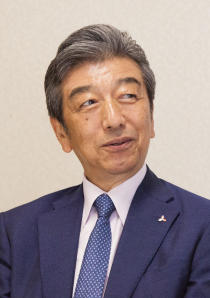
Yamanishi This may sound extreme, but I personally believe that costs for fundamental research should be covered by the national budget and all those for applied research by companies.
Yamagiwa We would be extremely grateful if that became the customary practice of funding college research. But for that to happen, I believe universities and companies first need to learn more about each other. So, it is a good thing that industry-academia collaboration has become more common over the past decade.
Yamanishi Open innovation will likely become more common in the near future, and the WISE Programs (Doctoral Programs for World-leading Innovative & Smart Education) can be expected to create opportunities for personnel exchange between companies and universities. My theory in this regard is that, in addition to exchanging researchers, universities and companies should also exchange their sales and financial department workers because by doing so, universities could learn about managing finances and also adopt a company perspective to examine educational issues.
In addition, companies should actively help university-founded startups.
Yamagiwa In FY 2018, Kyoto University enjoyed the highest national rate of increase in the number of newly launched university-founded startups. One feature of Kyoto University-founded startups is their diverse variety, and Kyoto University Innovation Capital currently invests in 29 seed and early-stage startups. Recently, more Kyoto University students are starting businesses while still in college, and I look forward to seeing them gaining even greater momentum from the financial support that graduates and companies provide them.
The possibility of a critical gap in information accessibility existing between the Kanto and Kansai regions, and the need for active information dissemination and advanced IT literacy education
Oku Despite society becoming increasingly information-based, I think the gap in information accessibility between the Kansai region and Tokyo is becoming greater. The Kansai region may be falling even further behind in both the amount of information it receives and disseminates. This trend is particularly apparent in such advanced technologies as ICT and artificial intelligence. We need faculty members at Kyoto University to more actively disseminate their research findings to Tokyo and also put more effort into improving the University's status by cultivating future leaders.
Yamanishi I agree. Cultivating engineers and researchers in the fields of artificial intelligence, IoT, and big data is an urgent issue for our country's governments, companies, and universities, and they need Kyoto University to help them more actively in this regard. However, detailed qualities expected of such engineers still need to be defined more clearly, as also pointed out by others, based on industry-academia discussion and collaboration.
Oku In addition to cultivating engineers able to lead advanced fields, Kyoto University needs to put more effort into laying a foundation for that to happen by helping students acquire IT literacy since all industries today require that ability.
Yamagiwa IT literacy education is currently provided as liberal arts courses and, at the graduate school level, as cross-departmental courses.
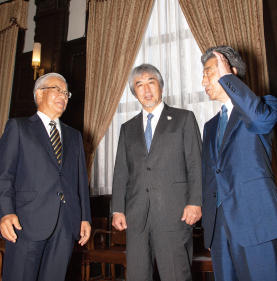
Oku Another important aspect of IT literacy education is who provides it. Kyoto University should follow the example of countries overseas that invite startup entrepreneurs in advanced fields as instructors to help students acquire IT literacy.
Yamanishi In addition, I assume there would be different opinions on the level from which college IT literacy education should start. Mine is that some Kyoto University students will have already acquired fairly high skills and would be better educated if the University could offer levels that meet their needs.
Oku The primary aim of college education is to help students build a foundation on which new capabilities can be added throughout life as necessary. Therefore, not everything that students learn at college will necessarily be directly applicable to business. However, in today's world, universities must also meet the actual business-related needs of working members of society. In countries overseas, many working members of society return to college to pursue their studies again. In Japan, only a small number of their counterparts so far do the same. The University of Michigan Law School taught me everything, from how to write contracts to various court cases based on mock trials. Specialized institutions of this sort are what cultivates experts, which I believe are what Japanese universities need to incorporate into their system in such ways as specialized institutions or postgraduate programs.
Yamagiwa I agree. Once Kyoto University finishes its current efforts, including laying the foundations for offering graduate school programs for working members of society, it will take initiative in doing just that.
The importance of having the young spirit of questioning everything and wanting to become a pioneer
Yamagiwa Kyoto University is planning to mark its 125th anniversary coming up in 2022 with three memorial projects aiming to cultivate people with even greater global competitiveness, research competence, and social collaboration leadership. May I ask if each of you have any message for the University on the occasion of its upcoming 125th anniversary?
Yamanishi There is only one thing I want for Kyoto University, which is for it to become the best in the world. Defining the criteria for deciding the world's best university is extremely difficult, but I can definitely say that pursuing this goal requires global competitiveness.
Yamagiwa I will keep that in mind. In 2019, Kyoto University ranked top in two indicators of a world university ranking published by a UK higher education magazine. However, as one of our graduates has put it, we need to do better than just "Ranking number one in Japan."
Oku The ideas that I consider particularly important among those underlying your WINDOW Concept are those represented by the "O" (Original and Optimistic) and the "D" (Diverse and Dynamic).
Being original is an essential part of Kyoto University's identity. The Kansai region's culture of generosity and freedom are undoubtedly part of its identity. However, the University also takes pride in being part of the former capital of Japan, and having been left behind when the capital was transferred to Tokyo, it has a spirit of anti-central government as well. This mixed identity of itself gives the University its fundamental power to come up with unique ideas and communicate them in unique ways. That is why Kyoto University always has been and will be original.
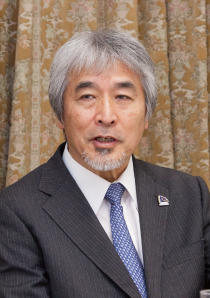
Yamanishi I believe its tradition of originality also has to do with Kyoto's geographical features. Kyoto has four beautiful seasons and its good old culture is still alive, which I believe help its residents develop into emotionally rich and proud community members aware of their city's uniqueness.
Yamagiwa I completely agree with you. Many citizens of Kyoto take pride in the fact that they live in a global city and cherish its originality.
Oku Maintaining an optimistic attitude is also important. I personally do not prefer the word rakkanteki (hopeful) as a translation of "optimistic." I think translating it as maemuki (positive) more accurately reflects our Kansai attitude.
Yamanishi After all, having a positive attitude is a prerequisite for cultivating the spirit of creativity that Kyoto University values.
Yamagiwa Even while competing with each other, if advancing ourselves requires cooperating instead, our Kansai culture enables us to make that switch. This aspect of our culture must be the driving force behind our creativity.
Oku In addition, I think the two "Ds" are interconnected; by that I mean diversity is the catalyst of dynamism. Diversity is not only about international influence on domestic students. During college, while I was of course inspired by talented international students, I was also stimulated by many interesting thoughts expressed by my friends from Osaka. Even within the same country, different regions have different temperaments, which I also consider a form of diversity. I hear that universities in Tokyo recently have a higher student ratio of locals to non-locals. What is the case at Kyoto University?
Yamagiwa Our student ratio is balanced out nicely.
Oku That's good to hear. I heard that Kyoto University's 125th memorial projects include building venues for international students and researchers to interact. I look forward to seeing similar projects being undertaken as effective ways for the University to use its donations collected on the occasion of its 125th anniversary.
Yamagiwa Lastly, may I ask if each of you have any message you would like to leave Kyoto University students with?
Oku The most important thing we need to do in our youth is questioning our surroundings. Neither science and technology nor the rules we make are perfect. I look forward to seeing Kyoto University students aggressively take up challenges by attentively reading the changes of the time and environment.
Yamanishi A truth with not only research but also all things is that the hardest thing to do is become a pioneer. I look forward to seeing Kyoto University students put the unrelenting courage they developed at the University to practice by taking up what each of them believes would be the toughest challenge.
Yamagiwa Thank you very much for your time today. To question our surroundings and take on challenges, there first needs to be something that sparks our curiosity. Kyoto University offers opportunities that will spark students' curiosity to help them develop themselves into strong unrelenting people able to take on challenges.
(Held in October 2019)
■ Gakushikaikan (Bachelor Hall) ■
The Gakushikai (Bachelors' Association) originated as a thank-you party held to honor the retirement of Professor Hiroyuki Kato, who was one of the presidents of Tokyo Imperial University. Subsequently, it developed into today's association for graduates of the former imperial universities (now seven national universities) to build and maintain friendships and share their knowledge.
The hall was first built in 1913 (Taisho 2) but destroyed by fire in the same year. It was then reconstructed but destroyed by fire again, which cycle repeated itself a number of times until ending in 1928 (Showa 3) with the construction of the one that stands today. The hall comprises a hotel, restaurants, conference rooms, and a wedding venue. It was originally built as a Gakushikai members-only facility. Today, however, it also welcomes non-members, excluding some areas.
The hall preserves its imposing, novel modern-style atmosphere even after over 90 years since construction and was registered as a national important cultural property in 2003 (Heisei 15).
